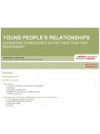Parents and caregivers have far more influence than they might think on how young people develop and conduct their relationships.
The Families Commission’s Supporting Young People’s Relationships shows that the popular perception that “kids never listen” is not entirely true when it comes to teenage relationship issues.
Instead, the study reveals that even when young people are not talking much, and don’t seem to be listening, they are still watching. Young people learn how to conduct their own relationships from watching how their parents behave, and they carry these lessons into their own adult relationships.
Purpose
The purpose of this project was to find out what support young people need as they have their first relationships.
For this project, young people were defined as people aged 11 to 18 years. The project did not include platonic relationships and was not specifically focused on understanding sexual activity in young people’s relationships. It is important to note that young people are not a homogeneous group. Age, gender, sexuality, culture, values, personality and experiences of other relationships, especially within their family, will all influence how young people think about, feel about and engage in relationships. Consequently, the types of support young peo-ple use and find effective will be different.
Methodology
The Families Commission searched and reviewed the limited literature and research available on relationship support for young people. We also talked with key stakeholders in the government and non-government sectors. In February and March 2009 we held the following focus groups and interviews:
• nine focus groups with young people in Auckland, Wellington and Christchurch, involving 77 young people
• four focus groups with parents, grandparents and whānau in Auckland, Wellington and the Wairarapa, involving 23 participants
• three focus groups with youth workers in Wellington and the Wairarapa, involving 14 participants
• interviews with seven school counsellors in Wellington and the Wairarapa, and a focus group with three social workers working in two South Auckland secondary schools.
We recruited these participants through contacts and, where possible, used existing groups (for example, youth groups, youth support-groups, young people at a boarding school, members of a Families Commission Parents Panel). The young people and parents and whānau were not related to each other. Our sample was small and selective (for example, we did not have sufficient representation in the focus groups from rural areas, Pacific peoples, other ethnic minorities or at-risk young people) and is therefore not representative of young people or parents in New Zealand, and the findings from this project cannot be generalised across the population.

